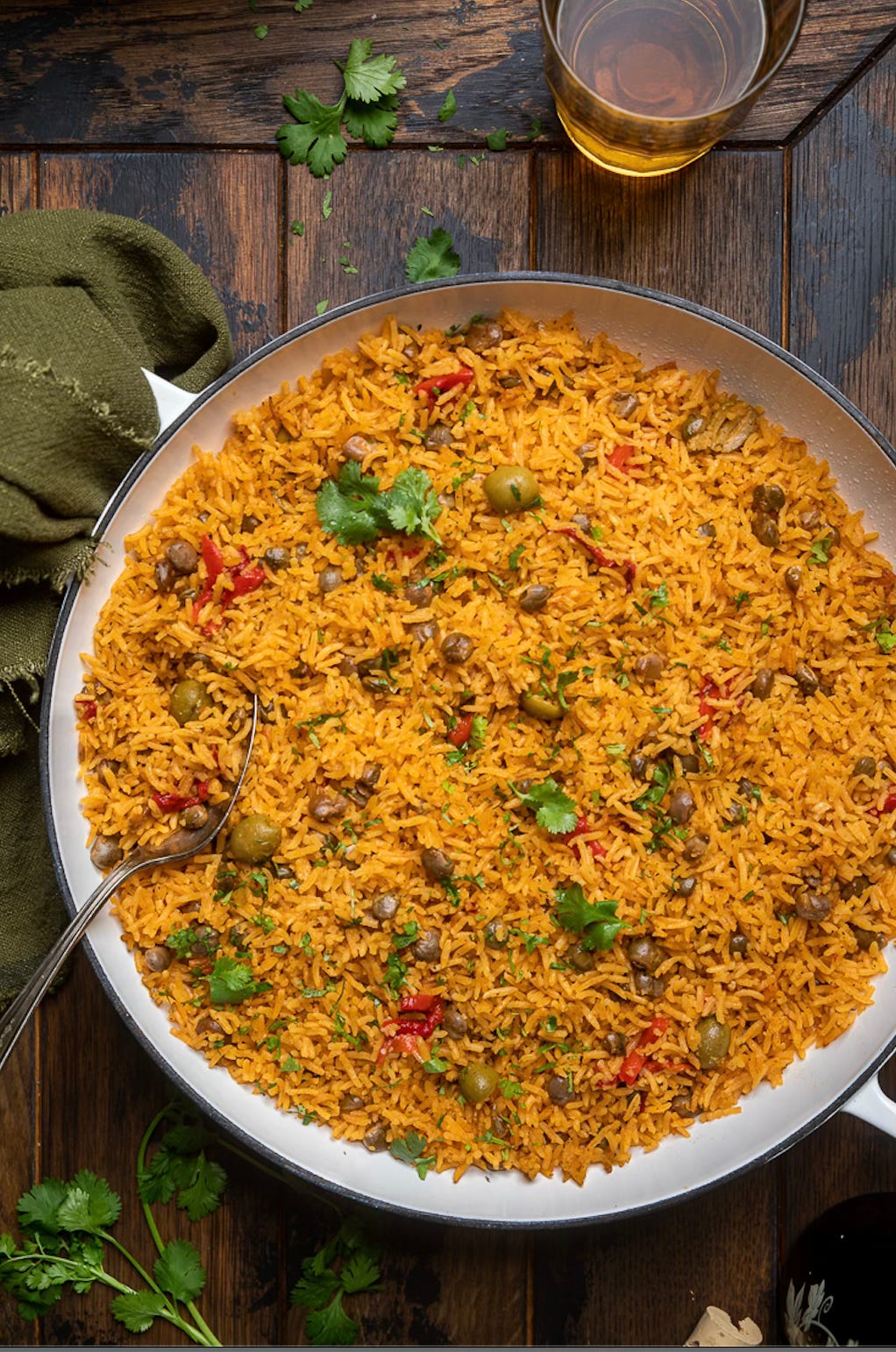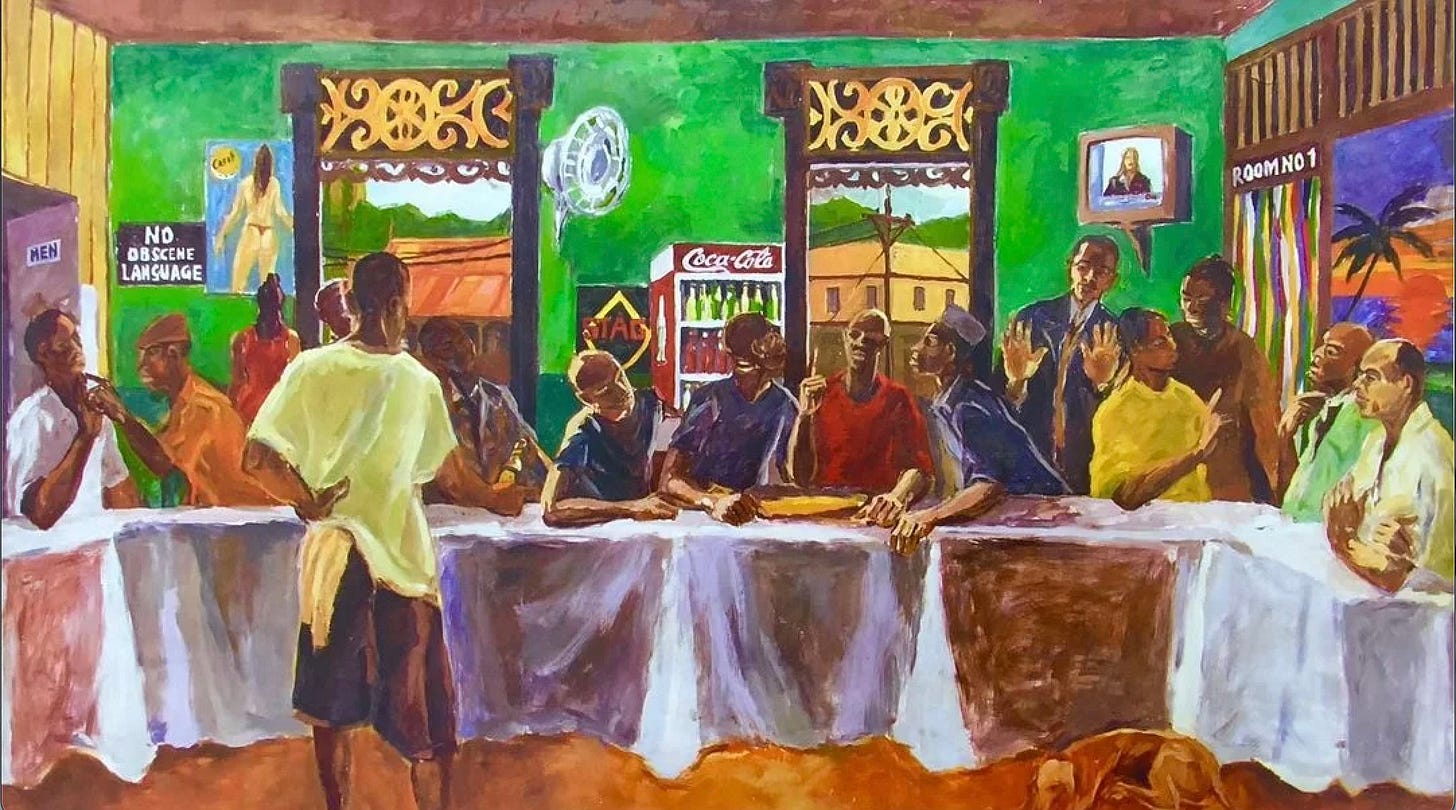Rice, Beans, and the Bread of Life
Caribbean Heritage Month Series: Honoring the Tables That Raised Us In this reflection on faith, family, and food, we explore how breaking bread—like Jesus did—can hold both tension and healing.
There’s a quiet holiness in a Caribbean kitchen.
You hear it in the sizzle of garlic meeting oil.
In the steady rhythm of pilón and pestle turning herbs into memory.
In the way rice and beans show up again and again on our tables as a faithful delicacy.
Food was never just food.
It was a love language. A peacemaking offering. A way to say “you’re still welcome here.”
Sometimes it was the only way forgiveness was spoken in a family.
Sometimes, it was the only way love was offered without condition.
In Caribbean homes, we don’t just feed bodies—we feed souls.
And nowhere is that clearer than at the table.
🍽 Breaking Bread with Judas: When the Table Holds Tension
Let’s be honest—some family dinners aren’t easy. Sometimes the table holds people who’ve hurt you. Who no longer align with your values. Who no longer know you and still see you as the version of yourself God already redeemed.
And yet… the table is still sacred.
At the Last Supper, Jesus sat with His disciples and with Judas.
He knew betrayal was coming. Knew the kiss, the coins, the cross.
And still… He fed him.
Still, He offered the bread. Still, He knelt to wash his feet. Sometimes the miracle isn’t walking away, it’s staying long enough to offer grace.
Not every conversation needs to be had.
Not every family member needs front-row access to your healing.
But sometimes, you’ll be called to sit beside someone who doesn’t understand your purpose and you still pass the plate.
Because love doesn’t always mean agreement.
Sometimes it simply means: I see you. I’ll feed you. I’ll let God do the rest.
🌶 The Pepper That Held the Pot Together
When the fiery one becomes the foundation
There’s always one in every family.
The one who speaks before thinking.
The one who storms out mid-argument but shows up early to help cook.
The one who burns a little too hot, but is fiercely loyal underneath it all.
Peter was that kind of disciple.
Hot-headed. Heavy-handed. Quick to cut off ears—literally. (John 18:10)
The kind of person people side-eyed at gatherings, unsure if he’d stir the pot or spill it.
And yet… Jesus called him the rock.
“On this rock I will build my church.” (Matthew 16:18)
The same man who denied Him three times would become the first to declare Him boldly.
The one who cursed under pressure would become the one who carried the early church.
In Caribbean kitchens, we know that sometimes, the pepper isn’t the prettiest part of the dish.
It’s the part you warn people about.
The part that might make you tear up a little, but it’s also what gives the whole pot its flavor.
That’s Peter. The scotch bonnet of the story. Spicy, unpredictable, not for the faint of heart, but absolutely essential.
And maybe you’ve got someone like that at your table.
Or maybe it’s you.You’ve been told you’re too much.
Too intense. Too emotional. Too bold.
But God isn’t put off by your fire.
He can build with it.
He does build with it.
Because sometimes the very ingredient we’re tempted to leave out is the one holding the whole thing together.
🧒🏽 Little Plates, Big Purpose: The Thunder Twins at the Kids’ Table
Why the next generation belongs in the room
In most Caribbean households, there was always a kids’ table. A little plastic table pulled up on the side, bright-colored cups, mismatched spoons, and tiny chairs that creaked with too much joy.
At a glance, it looked like playtime, but if you really watched… they were learning everything.
Who got the biggest piece of plantain. How abuela stirred her coffee just right. What stories were safe to ask about and which ones carried silence.
The children weren’t just guests. They were witnesses.
In scripture, Jesus welcomed youth with the same kind of reverence. James and John, the “Sons of Thunder,” were likely teenagers when He called them.
Young. Bold. Passionate. Loud.
They didn’t have it all figured out, but they didn’t need to. Jesus brought them close anyway.
He corrected them, but He never dismissed them.
And that’s the lesson:
The ones at the kids’ table now might be the ones carrying the table later.
So many of our traditions were passed down without paper—just rhythm, repetition, and reverence.
How to season without measuring.
How to listen when elders speak.
How to respect the silence before a blessing is said.
It’s our job to bring them in. To let them taste and see. Tell the stories out loud while they still want to hear them and make sure what we inherited doesn’t die with us.
Because legacies don’t live on accident.
They live on purpose—plate by plate, story by story, prayer by prayer.
🫓 Bread for the Prodigal: Leaving Room for the Return
Every family has a prodigal.
The one who left.
The one who hurt you.
The one you’re not sure you’ll ever trust again.
But Jesus told us the story of the father who ran toward the prodigal with open arms,
Who didn’t shame him, but instead said,
“Kill the fattened calf. Prepare the feast. My son has come home.” (Luke 15:23-24)
Sometimes we’re the prodigal. Sometimes we’re the one preparing the feast. And sometimes, we’re the bitter brother in the corner—wondering why grace came so easily for them. While we stayed faithful laboring and haven’t even received 1/10th of the fruits.
No matter where you sit in the story, the truth remains:
There’s always a place at the table.
No matter how long it’s been.
No matter how far you’ve gone.
✝️ The Table as an Altar
In our Caribbean roots, the table wasn’t just for meals. It was where healing happened.
Where grudges dissolved over sancocho.
Where children memorized family recipes and the smell of home.
Jesus turned a regular table into a place of remembrance:
“Do this in memory of Me.” (Luke 22:19)
Your family table might not be perfect.
But when it’s centered in love, your heart builds an altar for it, marking the memory of what happened there like the Israelites did when God showed out for them.
Bread becomes healing.
Rice becomes history.
The table becomes home.
✨ Reflection Questions:
Who do you need to break bread with, even if it’s hard?
Who at your table is becoming the “rock” you didn’t expect?
What wisdom can you pass to the next generation before the recipe is forgotten?
✨ Reflection Prompt:
What meal helped your family come back to one another?
What does the table mean to you now that you are in the adult seat?




I love the connection of a Caribbean table/attributes to Jesus and the disciples 🙌🏾. The imagery is beautiful.